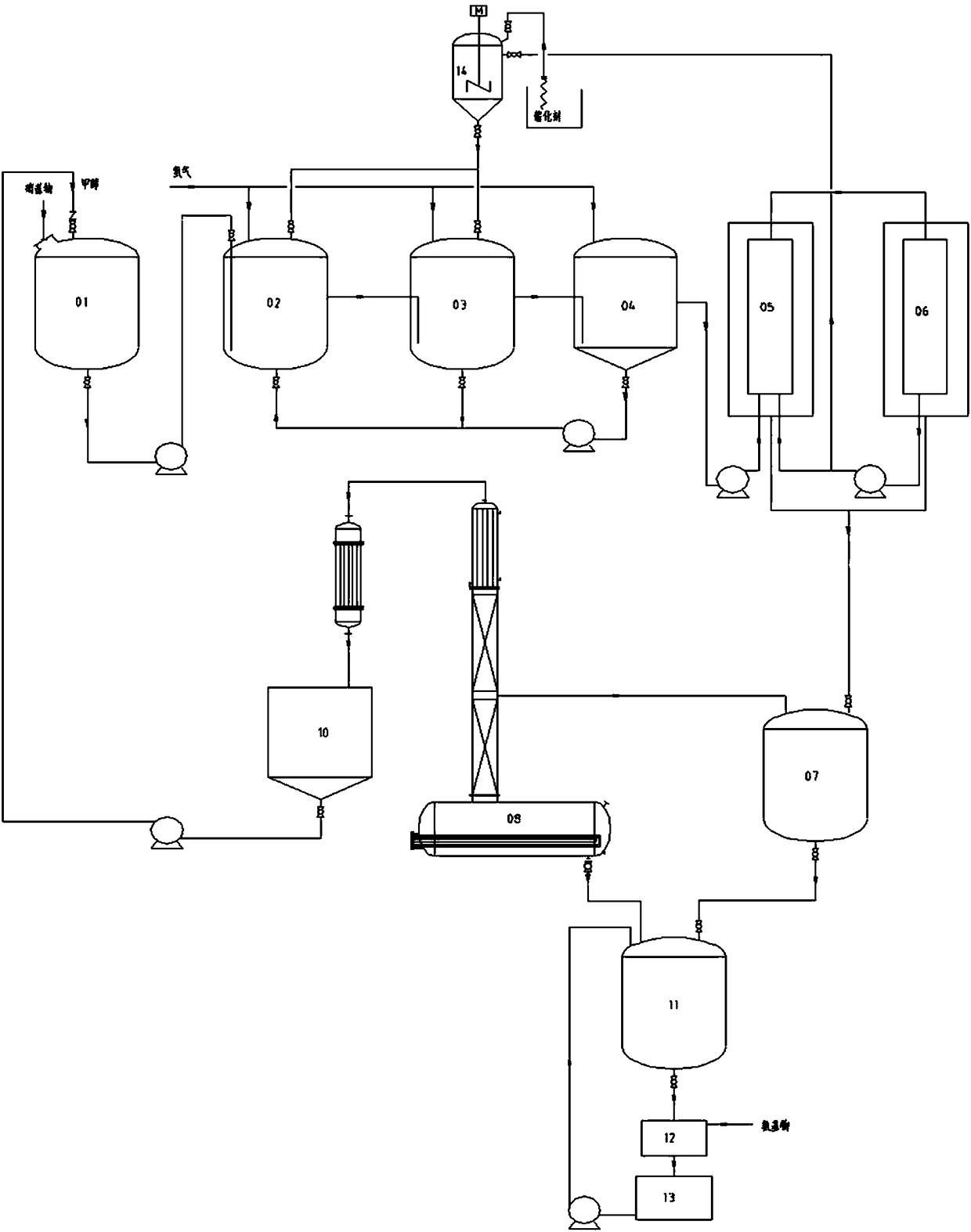Preparation method of p-aminophenol
A technology for p-aminophenol and p-nitrophenol is applied in the field of preparation of p-aminophenol, and can solve the problems of uncontinuous production, environmental pollution, and many three wastes.
- Summary
- Abstract
- Description
- Claims
- Application Information
AI Technical Summary
Problems solved by technology
Method used
Image
Examples
Embodiment 1
[0096] A preparation method of p-aminophenol, using p-nitrophenol as raw material, adopting ReneyNi catalyst, carrying out continuous catalytic hydrogenation reaction in a reactor, after the catalyst is separated and recovered, the reducing solution is precipitated, and purified to obtain the target product p-aminophenol phenol.
[0097] Specific steps include:
[0098] (1) Put 5000kg of 50% methanol aqueous solution and 1250kg of p-nitrophenol into the chemical material tank, follow-up feeding is carried out according to this ratio, stir evenly, pump into the first-level hydrogenation reactor, add ReneyNi catalyst 125kg, catalyst The particle size is 10nm, pass through the nitrogen replacement system three times, then pass through the hydrogen replacement system three times, start stirring, raise the temperature to 90-100°C, and pump p-nitrophenol into the primary hydrogenation kettle at a flow rate of 6000L / h The raw material solution, into the H 2 , the hydrogen pressure ...
Embodiment 2
[0102] (1) 5000kg of 50% methanol aqueous solution and 1250kg of p-nitrophenol are put into the chemical material tank, and the follow-up feeding is according to the ratio, stirred evenly, pumped into the first-level hydrogenation reactor, and 125kg of ReneyNi catalyst is added, the catalyst The particle size is 500μm; pass through the nitrogen replacement system three times, then pass through the hydrogen replacement system three times, start stirring, raise the temperature to 80-90°C, and pump p-nitrophenol into the first-stage hydrogenation kettle at a flow rate of 5000L / h Raw material liquid, pass into H 2 , the hydrogen pressure in the control system is 3.0MPa, and 2.5kg of ReneyNi catalyst is added to the primary hydrogenation reactor every 3 hours. After the material in the primary hydrogenation reactor gradually increases, it flows into the secondary reactor through the overflow port. In the hydrogenation kettle, the material stays in the hydrogenation kettle for about...
Embodiment 3
[0106] (1) Put 12500kg of 50% methanol aqueous solution and 1250kg of p-nitrophenol into the chemical material tank, and then stir the subsequent feeding according to the ratio, stir evenly, pump it into the first-level hydrogenation reactor, and add 125kg of ReneyNi catalyst, The particle size of the catalyst is 10nm; pass through the nitrogen replacement system three times, then pass through the hydrogen replacement system three times, start stirring, raise the temperature to 90-100°C, and pump p-nitrogen into the first-stage hydrogenation kettle at a flow rate of 6000L / h The raw material solution of phenol is passed into H 2 , the hydrogen pressure in the control system is 3.0MPa, and 2.5kg of ReneyNi catalyst is added to the primary hydrogenation reactor every 3 hours. After the material in the primary hydrogenation reactor gradually increases, it flows into the secondary reactor through the overflow port. In the hydrogenation kettle, the material stays in the hydrogenatio...
PUM
| Property | Measurement | Unit |
|---|---|---|
| Average pore size | aaaaa | aaaaa |
| Particle size | aaaaa | aaaaa |
| Average pore size | aaaaa | aaaaa |
Abstract
Description
Claims
Application Information
 Login to View More
Login to View More - R&D Engineer
- R&D Manager
- IP Professional
- Industry Leading Data Capabilities
- Powerful AI technology
- Patent DNA Extraction
Browse by: Latest US Patents, China's latest patents, Technical Efficacy Thesaurus, Application Domain, Technology Topic, Popular Technical Reports.
© 2024 PatSnap. All rights reserved.Legal|Privacy policy|Modern Slavery Act Transparency Statement|Sitemap|About US| Contact US: help@patsnap.com








